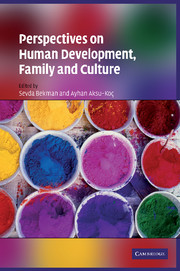Book contents
- Frontmatter
- Contents
- List of figures
- List of tables
- List of contributors
- Preface
- Foreword
- Selected international publications by Çiğdem Kağıtçıbaşı
- I Cultural and cross-cultural psychology: selected perspectives
- 1 Indigenization and beyond: the process and extent of psychology's growth as an international science
- 2 The continuing quest for psychological universals in categories, dimensions, taxonomies, and patterns of human behavior
- 3 Circumnavigating the psychological globe: From yin and yang to starry, starry night
- 4 The emerging global psychology movement: Lessons from Arab psychology
- II Development in the family context
- III Culture and self
- IV Social change, family, and gender
- V Induced change
- Epilogue
- Subject Index
- Author Index
- References
1 - Indigenization and beyond: the process and extent of psychology's growth as an international science
selected perspectives
Published online by Cambridge University Press: 04 August 2010
- Frontmatter
- Contents
- List of figures
- List of tables
- List of contributors
- Preface
- Foreword
- Selected international publications by Çiğdem Kağıtçıbaşı
- I Cultural and cross-cultural psychology: selected perspectives
- 1 Indigenization and beyond: the process and extent of psychology's growth as an international science
- 2 The continuing quest for psychological universals in categories, dimensions, taxonomies, and patterns of human behavior
- 3 Circumnavigating the psychological globe: From yin and yang to starry, starry night
- 4 The emerging global psychology movement: Lessons from Arab psychology
- II Development in the family context
- III Culture and self
- IV Social change, family, and gender
- V Induced change
- Epilogue
- Subject Index
- Author Index
- References
Summary
For psychology to become a truly international science requires the participation and inclusiveness of contributions arising from diverse societies and cultures around the world. Few psychologists have worked harder to promote this goal than Çiğdem Kağıtçıbaşı. From the platform afforded by her election to various prestigious international psychological and social science organizations, she has passionately and untiringly championed the cause of psychology internationally, especially in “majority world” (MW) countries. It is fitting that she was the third of nineteen recipients and the only psychologist from a MW country ever to receive the APA Award for Distinguished Contributions to the International Advancement of Psychology.
Even though the award was undoubtedly due to her cross-cultural work and applied research with mothers and children in her native Turkey, she deserves to be applauded for her at times less visible work on behalf of psychologists from MW countries. In 1994 and 1996, Çiğdem was Coordinator of the program of Advanced Research and Training Seminars (ARTS), co-sponsored by three international associations (IUPsyS, IAAP, and IACCP) to provide the opportunity for specialized training and attendance at international congresses of psychologists from MW countries. Having succeeded Çiğdem as ARTS Coordinator for the next four international congresses, 1998, 2000, 2002, and 2004, I also followed her lead in vigorously advocating support for the program and for MW psychology as a member of the Executive Committee of the International Union of Psychological Science (IUPsyS). I came to accept and promote her terminology in my own research after we collaborated in editing a special issue (Adair and Kağıtçıbaşı 1995) on the development of psychology in developing countries.[…]
- Type
- Chapter
- Information
- Publisher: Cambridge University PressPrint publication year: 2009
References
- 4
- Cited by



